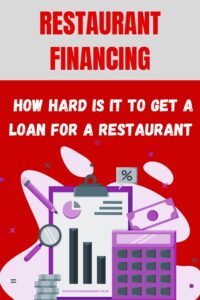Guide to Restaurant Financing
Opening or expanding a restaurant requires substantial financial investment. How hard is it to get a loan for a restaurant, examines the various financing options available to restaurateurs, helping you make informed decisions about securing the necessary capital.
Understanding Restaurant Financing
Securing adequate funding is crucial for restaurant success. Financing can cover initial startup costs, renovation, equipment, inventory, and working capital. Evaluating different financing options is essential to finding the most suitable one for your specific needs.
Why Restaurant Financing is Essential:
- Startup Costs: The initial investment can be steep, covering everything from location leasing to interior design.
- Renovations: Existing spaces often need updates or complete overhauls to meet your vision.
- Equipment: High-quality kitchen equipment is vital and expensive.
- Inventory: The initial stock of ingredients and supplies can add up.
- Working Capital: Ensures smooth operations and covers unexpected expenses.

Types of Restaurant Financing
-
Traditional Bank Loans
Traditional bank loans are a standard financing option for restaurants. These loans typically offer lower interest rates and longer repayment terms. However, they require a solid credit score, a detailed business plan, and collateral.
Pros:
- Lower interest rates: Typically more affordable than other financing options.
- Long-term financing options: Allows for manageable repayment schedules.
Cons:
- Strict eligibility criteria: Requires good credit and substantial documentation.
- Lengthy approval process: This can take time, which might not be ideal for urgent needs.
- Government-backed Start Up Loan
The government-backed Start Up Loan offers loans of £500 to £25,000 to start and grow your business. It supports small businesses, including restaurants. Startup loans provide favourable terms and conditions, making them an attractive option for restaurateurs.
Pros:
- Lower down payments: Easier to manage initial outlays.
- Extended repayment terms: Provide more time to pay back the loan.
Cons:
- Extensive documentation required: Prepare for a lot of paperwork.
- Can be time-consuming to secure: The process can be slow and meticulous.

-
Equipment Financing
Equipment financing is a specialised type of funding that is intended to assist in the acquisition of restaurant equipment. This form of financing is backed by the equipment, making it easier to secure.
Pros:
- Easier approval process: Since the equipment serves as collateral.
- Equipment acts as collateral: Reduces the lender’s risk.
Cons:
- Higher interest rates: Typically more expensive than traditional loans.
- Limited to equipment purchases: Cannot be used for other expenses.
-
Business Line of Credit
A business line of credit allows restaurant businesses to access funds as needed, providing a valuable financial resource and allowing restaurants to withdraw money up to a predetermined limit as needed. This choice is perfect for effectively managing cash flow and handling unforeseen expenses.
Pros:
- Flexible borrowing: Access funds as needed.
- Only pay interest on drawn amounts: Saves on interest costs.
Cons:
- Variable interest rates: Can fluctuate, leading to uncertainty.
- Requires good credit history: Approval depends on your creditworthiness.
17 Restaurant Finance And Funding Options: What Are The Best?
-
Merchant Cash Advances (MCAs)
Merchant cash advances (MCAs) offer a one-time cash payment in return for a percentage of upcoming credit card transactions. This choice allows for rapid access to money but is associated with high costs. Fees and repayment terms tied to daily sales.
Pros:
- Quick funding: Access cash rapidly.
- No collateral is required, which means lower risk for the borrower.
Cons:
- High cost: Fees can be substantial.
- Daily repayments can impact cash flow: Tied to your daily sales, which can be unpredictable.
- Crowdfunding
Crowdfunding platforms like Kickstarter and Indiegogo allow restaurateurs to raise funds from a large number of people. This method not only provides capital but also helps build a loyal customer base.
Pros:
- Access to a wide audience: Reach potential customers and investors.
- Builds community support: Engage with your community and create buzz.
Cons:
- No guarantee of success: Campaigns may not reach their funding goals.
- Requires significant marketing effort: Needs a compelling pitch and continuous promotion.

-
Angel Investors
Angel investors are typically individuals who invest their own money in early-stage startups in exchange for an ownership stake. Apart from financial support, they frequently provide valuable advice and linkages within the particular industry.
Pros:
- Access to large sums of money: Can secure significant funding.
- Potential for valuable advice and networking: Benefit from investor’s experience and contacts.
Cons:
- Requires giving up equity: You might need to share ownership.
- Can involve complex negotiations: Terms and agreements can be intricate.
-
Venture Capital
Venture capital firms invest in high-growth potential businesses in exchange for equity. This option is suitable for restaurants with scalable business models and ambitious expansion plans.
Pros:
- Significant funding potential: Access large amounts of capital.
- Access to expertise and resources: Benefit from investor’s resources and guidance.
Cons:
- Loss of control: Investors will want a say in business decisions.
- High expectations for rapid growth: Pressure to scale quickly.
How To Manage A Restaurant Finances To Skyrocket You Profits
Choosing the Right Financing Option
To make a sound decision about financing options for your restaurant, it’s essential to consider factors such as how hard is it to get a loan for a restaurant, also consider your restaurant’s financial standing, its growth strategies, and your comfort level with risk. Follow these steps to ensure that you make an informed choice:
- Assess Your Needs: Before proceeding with any financial decisions, it’s essential to assess your needs by determining the amount of capital required and the purpose of the funds.
- Evaluate Your Financial Health: Review your credit score, financial statements, and cash flow projections.
- Explore Options: Research different financing options and compare their terms, conditions, and eligibility criteria.
- Seek Professional Advice: Consult with financial advisors or accountants to understand the implications of each option.
- Prepare Documentation: Gather necessary documents such as business plans, financial statements, and tax returns.
Related articles:
How To Manage A Restaurant Finances
Conclusion
Securing the right financing is vital for your restaurant’s success and growth. To answer the question, how hard is it to get a loan for a restaurant? It’s crucial to carefully consider and assess the different options available to make well-informed decisions that are in line with your business objectives. Whether you opt for traditional loans, innovative financing methods, or a combination of both, thorough research and preparation will increase your chances of securing the necessary funds to thrive in the competitive restaurant industry.
FAQs
- What are the main types of restaurant financing available?
There are several types of restaurant financing options, including traditional bank loans, SBA loans, equipment financing, business lines of credit, merchant cash advances, crowdfunding, angel investors, and venture capital.
- How do I choose the best financing option for my restaurant?
Choosing the best financing option depends on your restaurant’s financial health, growth plans, and risk tolerance. Assess your needs, evaluate your financial health, explore different possibilities, seek professional advice, and prepare the necessary documentation.
- What is the benefit of using crowdfunding for restaurant financing?
Crowdfunding allows restaurateurs to raise funds from a large number of people, providing capital and building a loyal customer base. It engages the community and creates buzz around the restaurant but requires a compelling pitch and significant marketing effort.
- What should I prepare when applying for a traditional bank loan for my restaurant?
When applying for a restaurant business loan from a conventional bank, it’s crucial to have a strong credit score, a detailed business plan, financial records, and collateral to offer. The approval process can be lengthy and involves extensive paperwork.
How To Manage Restaurant Finance, Especially With A Cash-flow Crunch


